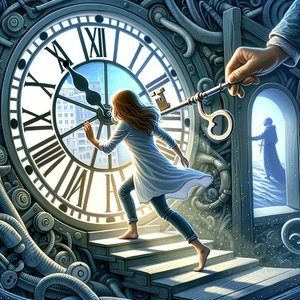Glass key and clock on Tamka Street

The fog that evening hung over the Thames like a thin, milky veil. The streetlights splashed amber circles in it, and from the bridge, somewhere further on, came the clatter of trams, as if someone were tapping away the minutes of the entire city. Maja pulled her hood up and sped up her stride. A small pack wrapped in parchment rang softly in her rucksack; each step caused a quiet, glassy tingle.
The Clock Workshop at 14 Tamka Street looked closed. The signboard - tin, green, with faded gold font - creaked as Maja came closer. The smell of grease and wood lotion wafted from inside. On the door hung a note with a cursive pen line: 'I'll be back at midnight'. This was strange, because when Maja left school, she had only stopped by to pick up her neighbour's watch. What she found, however, was Mrs Rut, a puzzlingly quiet clockmaker with hands like holy images: thin, precise.
- 'You've come,' said Mrs Rut, without lifting her gaze from the unfolded mechanism. - For some, the clock strikes faster.
Maja did not inquire. Sometimes adults said things that sounded like riddles, but were really just their way of being important. However, when Mrs Rut placed a small box in front of her and moved it so that the edges of their fingers rubbed against each other, Maja felt a gentle faint chill in her wrist.
- 'This is not the watch,' she began.
- 'What you're supposed to pick up will be at the ferry, on the shelf third from the top,' interrupted Mrs Rut. - 'But first...' - She tilted the box, and a key rolled out from inside, onto a soft scarlet cushion. It was transparent, as if it had been cut out of ice, and so smooth that you could hardly see the edges. There were flashes in the glass: they closed in like trapped skylights. - It belongs to you.
Maja laughed briefly. - To me?
- To the one who comes when the hand is not where it should be. At midnight, set the clock for thirteen o'clock,' she added softly. - You'll understand.
Maja wanted to say something else, but Mrs Rut was already tidying up her tools, and the wall clock above the door sped up a few seconds, as if suddenly embarrassed to be standing. Fleeting, she thought, grabbing her neighbour's key and pack. Fleeting light and fleeting words. Not to ask. To go home. To forget.
She didn't forget.
All evening she twirled the key in her hand, trying not to roll her eyes at her own curiosity. Familiar places - a courtyard in Powiśle, a wall overgrown with ivy, a vinyl shop - stretched out like a film tape that someone had rewound backwards and forwards until the image turned into silver flickers. On her desk, between her chemistry notes and an old analogue camera, lay the instructions from Mrs Rut: a sheet of paper with edges burnt like the books her grandmother liked. There wasn't a single word left on it - instead, at a certain angle of view, marks flowed out of the paper's fibres, white on white, like breath on a cold mirror: a map and a line leading from the studio to the tall building with the clock by which Maja always ate ice cream with her friends in summer.
"At midnight, set the clock for thirteen o'clock."
Reflexively, she checked her phone. 11:04 p.m. At home, her parents were watching a TV series, the sounds of laughter oozing from under the door. Maja slipped the key into the inside pocket of her sweatshirt, pulled on her trainers and quietly ran down the stairs. Outside, the fog was thicker; the light of the streetlights swelled, as if the city had taken a deep breath.
The clock on the building on Tamka Street was beautiful in a way that is hard to hold: ground stone and copper hands, Roman numerals, the patina of time. At the height of the third floor, the dial cut a bright circle in the façade. Maja raised her head and it made her stomach turn. It was like looking at an eye that is usually asleep, but in a moment it might be diverted.
The gate her grandmother had told her about more than once was ajar. "This is where time reports". - she used to repeat when Maja was little and count the stairs, jumping over every other step. Now she wasn't jumping. She breathed evenly, counting heartbeats. First floor: the smell of laundry and garlic soup. Second: the crackling dance floor. Third: the silence that seemed to wait.
At the end of the corridor, just before the wooden door leading to the attic, the board was newer than the rest. Her foot slipped on it and it squeaked plaintively. Maja held her breath. No light in the crack under the door. Just a ticking from inside - deep, metallic, like the heartbeat of someone with a mechanism in their chest.
The door was not locked, but the hinges defended themselves unhurriedly, as if someone on the other side was holding it with two fingers. A whiff of coldness hit her on the threshold. The great mechanism, occupying half the space, resembled a steel forest: gears the size of a bicycle, wheels smaller than plates, thin wires like strings. Shadows of the components overlapped on the walls and danced as the ticking moved from left to right.
Maja had always liked things that could be taken apart and put back together, but here she felt the kind of curiosity that is soft, a little painful, like new teeth. She raised her hand. On the wall, right next to the chalkboard with the long-unused chalkboard, she noticed a small hole. No bigger than a fingernail. The key in her pocket warmed up as if it wanted to find its way on its own.
She took it out. The glass handle diffused the light into tiny, overflowing sparks. As she brought the key closer to the opening, she heard a soft, high-pitched sound. Like the laughter of a mosquito or like a wire singing in the frost. She slid it in and turned it, and the whole mechanism responded with a sigh that went over the gears like a wave.
The seconds hand stood still. Its tip twitched, moved right, left - like a pendulum seeking a new centre. The Roman numerals faded, their outlines began to blur, and other characters took their place: thin, veined, resembling the drawing of a leaf. The clock, thought Maja, sounded different now. As if it were ticking underwater.
The smell she smelled was sweet and damp. The Vistula after the rain. The brackish breath of the tunnels. The door next to the mechanism, which she had not noticed before, slid open with a quiet clatter. Behind them was a narrow staircase of wood, polished by thousands of feet but which left no dust. The light was not light. More like a glow, suspended in the air like dust.
- Hello? - she called back in a half-voice, without conviction. The voice came back to her after a moment, broken, as if chewed through metal.
She went down two steps. Three. Her hair stood up, not from fear, but from the quiet electricity she felt in the air. It seemed to her that some of the cogs, the oldest ones, had tiny scratches on them not from use but from marks: engravings gouged with a knife, words scraped out in a hurry. She didn't want to read them. They cast shadows in the shape of letters.
In front of the clock face, on the inside, was a balcony. A slab of dark wood, the railing sanded by the hands of people who managed without keys. Maja walked up until her nose almost touched the light of the dial. The city on the other side was a blur: lampposts like luminous jellyfish, windows of townhouses like aquariums. She could lift her hand and touch the pointer. It was cool. And when she did, the pointer moved, once, pressing lightly on her finger, as if checking what it was made of.
She noticed marks on the wood of the balcony. They weren't fresh, but neither were they old: shoe prints in the fine dust, like fine maps. Someone had been here recently. Someone who had walked confidently. Maja looked around. The mechanism was silent, like a cat preparing to jump.
She grabbed the railing. The glass key, now slipped behind the cuff of her blouse, pulsed. The pulse reverberated in her fingers. Just at her wrist, like thin threads of light, silent marks ran across her skin. They resembled an arrangement of blood vessels. They were extinguished when she blinked.
- 'Don't play around, Maja,' she muttered to herself, recalling her father's tone from mornings when he chased her to school. - Just check and come back.
Then the clock chimed. It wasn't a ticking. Rather, a quiet thump of something deep inside, like a gong sunk in copper. In the mechanism, somewhere behind her, a mode skipped and the dial darkened from within, as if the shadow of a cloud was looming over it. A smudge appeared on the glass, as thin as a scratch on ice. It stretched, branched, and before she had time to realise it, the crack became a line, and the line became a crack.
A chill blew from the crack. And the smell of water so fresh it made her teeth hurt. Something trembled in the railing, barely perceptible. As if ants were wandering inside the wooden fibres. Maja withdrew her fingers, but couldn't look away.
In the glass of the dial, just opposite her, her face was reflected - only that the eyes of that one were silver like a mechanism, and the same, but deeper, marks shone on the skin of her wrist. That Maya held a second key in her hand. She picked it up, very slowly, as if lifting a cup.
- 'You're late,' she told her, louder than a whisper should allow, and it sounded as if several layers of the same voice were speaking at once.
Before Maja had time to ask anything, the mechanism whined a long, low sound, and the minute hand jumped violently, slipping right past her fingers. The gap in the dial widened to the width of her hand and something that looked like mist, but was as heavy as water, began to ooze inside.
Autor zakończenia:

 English
English
 polski
polski
 Co było dalej?
Co było dalej?



